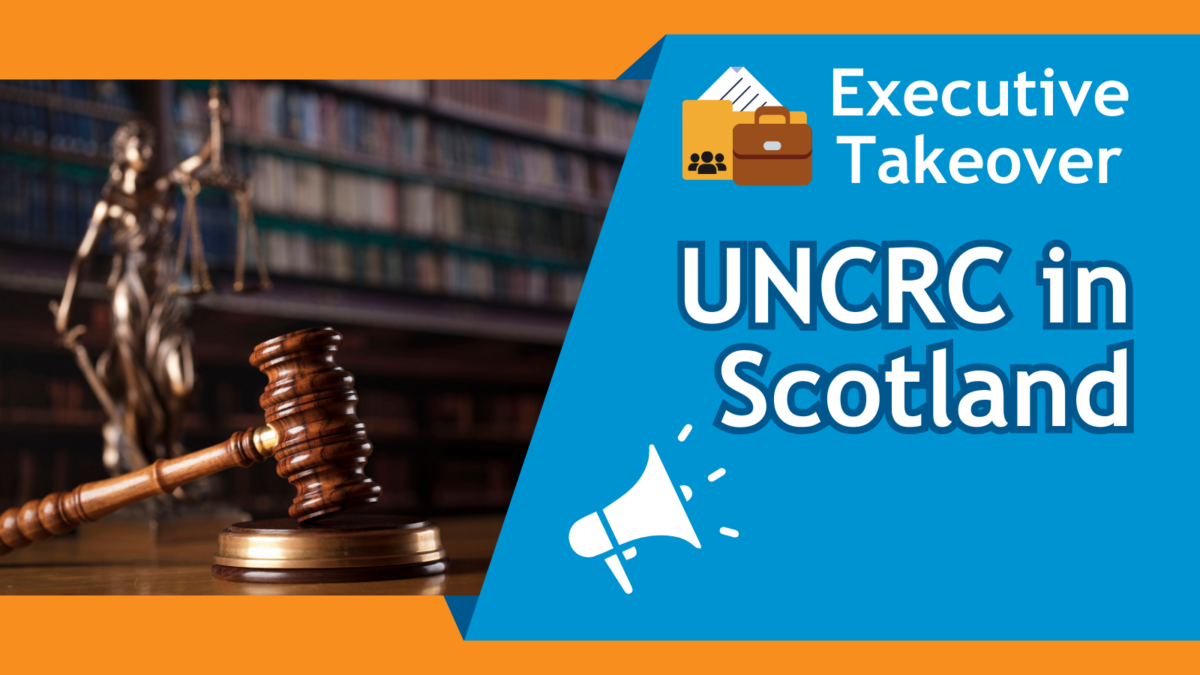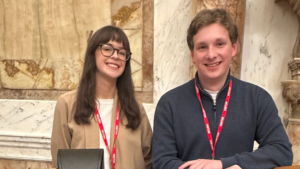At the Annual Children and Young People’s Executive Takeover 2023, Isla Grant MSYP and Crisantos Ike MSYP gave a speech to the Permanent Secretary, Directors-General and other civil servants on UNCRC in Scotland.
You can read our speech below:
The topic of the UNCRC has been raised at every single Cabinet and Executive Takeover, since they began a years ago. Even recently, at the Cabinet Takeover of June this year, our colleague Marcus Flucker MSYP delivered a powerful and inspiring speech on UNCRC incorporation, which spurred decision makers on to act with more urgency.
We must not lose momentum with this, we must not become complacent about children and young people’s rights. The fact that this Bill is moving forward is a great achievement for decision makers and young people alike in Scotland, and we as MSYPs are very happy to see it progressing after many, many years of work, but completing its journey and ensuring what happens next is successful is still very high on our agenda.
An important part of this next step in our work on the UNCRC is ensuring seldom-heard groups are heard, as often they can be furthest from their rights and face barriers to addressing this. This work is crucial, even if it is challenging. We want to share with you some of the lessons from the work we’ve been doing on diversity and inclusion in relation to gender and race at SYP.
We know you have been working hard to ensure Scotland is the best place to grow up and that children’s rights are protected. But we also believe that we can do better. These rights are so important and even more so for groups of children and young people who are likely to be targeted and face extra barriers due to their racial identity, for example.
One of our priorities in the Scottish Youth Parliament is to ensure that our spaces are diverse and inclusive, from our members to the young people and other organisations we engage with. This is not only a priority but also one of our key values. We are committed to being truly inclusive and work tirelessly to ensure policymakers and politicians hear the voices of young people from every community and background in Scotland.
I want to draw a focus on a particular piece of work I have had the opportunity to lead. This work started from the creation of a group of MSYPs called ‘The Movement’ which focused on anti-racism. Members of the Movement did this by illuminating the experiences of MSYPs of colour and raising awareness of inequality. From consulting with the further membership, we were able to create a resource that demonstrates our responses and key recommendations.
So, you might be wondering, how does this work fit into UNCRC incorporation?
Article 12 of the UNCRC states that young people have the right to express their views freely and have their opinions listened to in all matters affecting them.
Throughout my experience as a young Black person as well as engaging with other young people of colour, it has been evident that some of our needs, are different from white children and young people. Therefore, for participation to be inclusive and in line with the UNCRC it needs to account for this.
Article 2, states that every child has rights ‘without discrimination of any kind, irrespective of the child’s or his parents or legal guardians’ race, colour, sex, language, religion, ethnic or social origin. Quoting directly from the State of Children’s Rights report, a young person stated that ‘Racism hurts children and adults, and it happens so much today’. Please remember that this is only a statement from one young person, just imagine how many how many children and young people face inequalities as issues like racism affect many parts of Scottish society. You must ensure all teams that consult with young people know how racism and discrimination can impact young people and their participation. And that there are actions and resources to address this.
We also must acknowledge the significance of representation, especially in government and even amongst civil servants which play a key role in delivering the work politicians have set to do. When asking an MSYP a question in relation to representation in leadership roles they answered; ‘I just feel like it gives you some sort of confidence that you wouldn’t think you’d get from seeing people who look like you’. I believe that representation plays a key role in allowing children and young people of colour to not only see themselves in those roles but also become confident about speaking on their rights and having their say in a meaningful way. This will make a massive difference as it will mean there is more engagement with seldom-heard groups so their views will be more accurately represented.
I now want to draw your attention to work we have been doing as part of SYP’s Women’s Empowerment Programme. For many young people, speaking to decision makers can be a daunting thought. Fear of being judged, saying the wrong thing, or just not being taken seriously can all play on people’s minds. More often than not, these worries are heightened significantly when it comes to young women. This creates barriers to participation, meaning their voices are not heard, and their views are not accurately represented. Because of this, the rights of young women are not upheld, especially Article 12 of the UNCRC, the right to have your views taken seriously, which I believe is arguably one of the most key rights for young people in Scotland today.
SYPs Women’s Empowerment Programme conducted research in order to find out the experiences of women within the organisation. While a variety of topics were raised, by far the most common were concerns about engaging with and being taken seriously by decision makers. They highlighted worries about appearance, the way they carry themselves, the way they word questions and answers. One MSYP even said “Sometimes I feel like women, girls in SYP are held to a different standard to the guys”.
Even I stand before you today, delivering this speech, with the same flurry of questions in my mind. “Am I speaking clearly enough, and can they understand what I’m saying? Am I being too demanding and bossy? I hope they don’t find me annoying.” My own mind working to my detriment to prevent myself from participating and undermining myself for fear of not being taken seriously.
After UNCRC incorporation, these young women and more will be able to take the leap into participation in politics and activism. Having rights like Article 12 embedded in law is absolutely necessary for seldom heard groups to participate to their full potential, without fear or worry, and to have their voices heard without prejudice.
But having our rights in law is not enough for seldom heard groups. Taking away this fear of participation can only happen if decision makers respect this, and abide by the spirit of the convention.
This leads to how we can all create culture change. Because this is not a ‘one-person’ job. We must all (adults, government officials, civil servants, educators and young people) contribute to this to make sure a society that incorporates UNCRC rights is striving towards inclusiveness and visibility of rights. I am talking about how we can all become active human rights defenders instead of passive bystanders. This would help with tackling small issues within a community, which can lead to tackling further national issues – much like a domino effect, it takes that small step first. One way we can do this is through education. However, we must find more avenues to create this change and promote more conversations about how to do this. Hopefully us coming here to remind you of the importance of our rights is meaningful for starting that.
Creating a change of culture is key to ensuring that the implementation of the UNCRC has a real, tangible effect on Scottish life. To young people, knowing that the adults tasked with looking after us really do care about our rights and wellbeing is as important as the implementation of the rights themselves. The Government can commit to this culture change at a minimum though committing to the task of thoroughly and accurately reporting on children’s rights. We hope this awareness can help you to understand where there are gaps in your work.
So, what our key asks to you? Firstly, to acknowledge that many of the issues we have talked about are not as simple as they seem. We know that not all young people experience the same things and so as the complex humans we are, we need you to also look at an intersectional approach to participation to include the voices of young people from all backgrounds, this will help ensure our participation is not tokenistic. Secondly, education and promotion of these rights are crucial so that children and young people can thrive without any barriers and exercise their right in a safe and inclusive manner.
This will take time; a culture of change is gradual but one thing I have learned in all my years as an advocate for young people is that seeing the results after adversity gives you the most fulfilling feeling ever.


